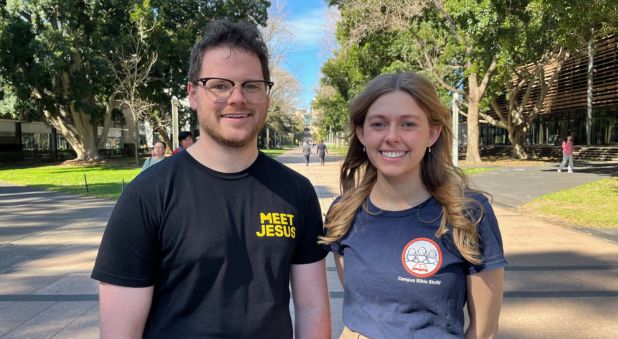It doesn’t seem so long ago that, when talking to young people about Jesus, the questions most often related to whether Christianity was true, and the historical facts of our faith.
These days, campuses are still buzzing with gospel workers keen to talk about the good news with students searching for answers... but what are they asking about?
For Ryan and Natasha Betbeder-Matibet, both in their second year of Campus Bible Study’s traineeship program at the University of NSW, the questions they’re most commonly asked are less about whether Christianity is true (or even if it’s good), but more about whether it “works” and can blend appropriately with a student’s own experience.
“Non-Christians are interested in the practicalities of whether Christianity works, in terms of: Do you get to talk to God? And does he actually answer your prayers?” Mr Betbeder-Matibet says. “I think the questions are more experiential than moral.”
He recalls a walk-up chat with one student who regarded Jesus as an imaginary friend he could unburden himself to when he was stressed.
“I said Jesus might talk back to him... He wanted to know how that worked, and is it possible that Jesus could talk to him in the Bible, and what would he say? It was experiential. I think this generation has a self-defining attitude to truth – that is, my experience is what the truth is.”
Mrs Betbeder-Matibet agrees, having had a number of conversations with people who made up their minds about God and the Bible based on their experiences. So, “if that doesn’t align with what the church and the Bible are saying, they say, ‘I’m going to change how I perceive God rather than let the Bible show me how to see him – fit him into that rather than let the Bible tell me who he is.’”
It’s not too far from her own faith journey, which began early in high school. Despite being open to what the Bible was saying, she recalls working to fit what she read or heard into her existing experience.
“However, as I continued to read the Bible, I grew and learnt that God is the one who tells us who he is... He shows us that experience can’t be relied upon,” she says. “You as a created being deciding something for yourself just isn’t the ultimate source of truth, unlike the God of the universe telling you!”
Having a conversation
If you want to talk about Jesus with someone of university age, the couple suggests that:
- discussion about the historical Jesus could still be part of a conversation, but unbelievers are more likely to bring it up as proof that we can’t trust what the Bible or other sources say, because it’s too long ago (they also think the same thing about Julius Caesar);
- students are looking for solutions to the problems of the world, Natasha says – from housing crises to war and global warming – so they need to see that “the big problem of the world is actually sin, and that the Bible provides the perfect solution for the problems they’re experiencing”;
- the greatest barrier to faith is understanding that living with Jesus as Lord will change their life and lifestyle;
- they’re most likely to lean into the things of faith if they have a Christian friend, and are shown the biblical character and person of Jesus.
“Having a Christian friend they can trust is really big but the character of Jesus is also quite compelling,” Mrs Betbeder-Matibet says. “Instead of dwelling on all these other issues and problems they might have with the Bible or Christianity, you show them Jesus – who might be very different to the Jesus that they think they know!
“Relationship is really important. Building trust. It’s so important to care about them as a person and not just as a ‘project’. They’re human, and they have had different experiences in their life that will mean they’re interested in different things, so be prepared to show them Jesus and build a relationship with them.”
Adds Mr Betbeter-Matibet: “The other challenge is, do you feel you can explain your experience of the world today from the Bible? Because I think if you struggle to do that you might struggle to share the gospel with young people.
“I don’t think I’m raising the bar there... if you understand the gospel you can explain the world we are living in. And that’s a good thing for Christians to think about.”






















